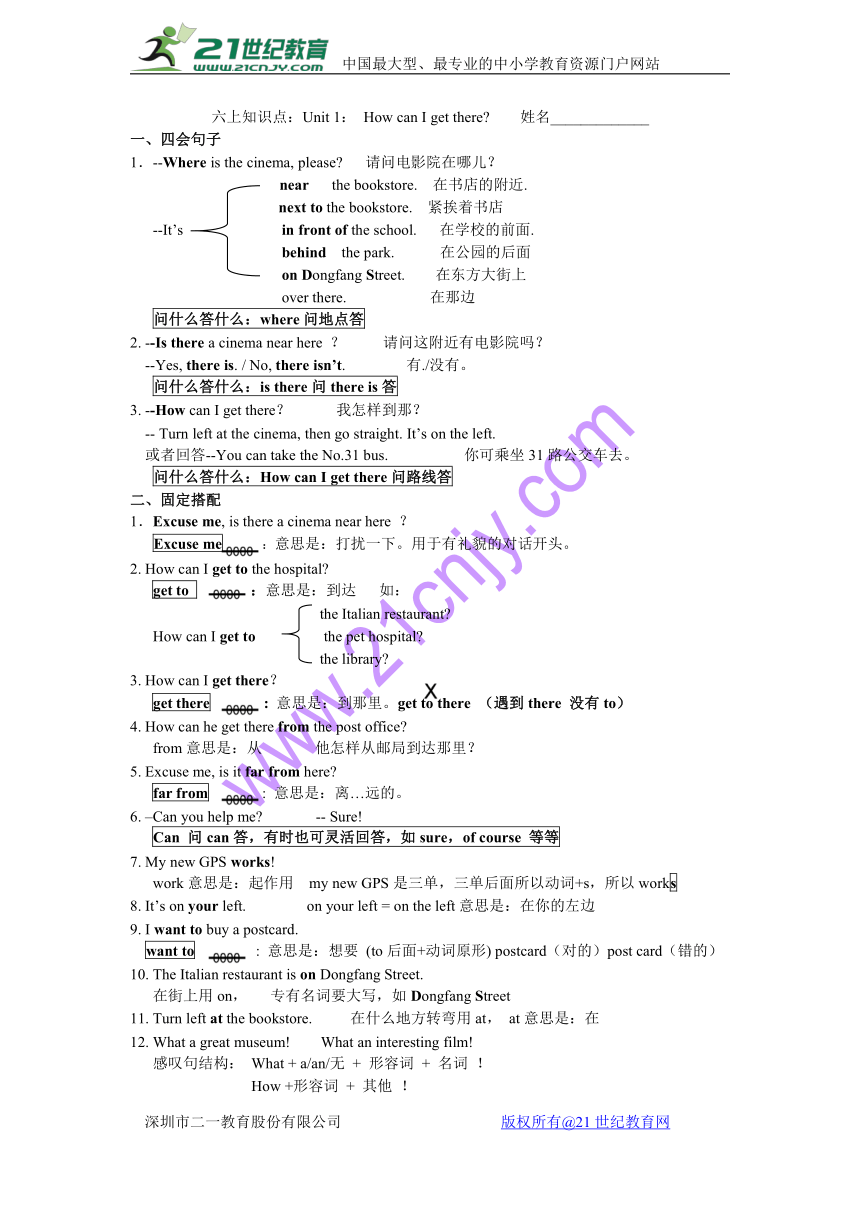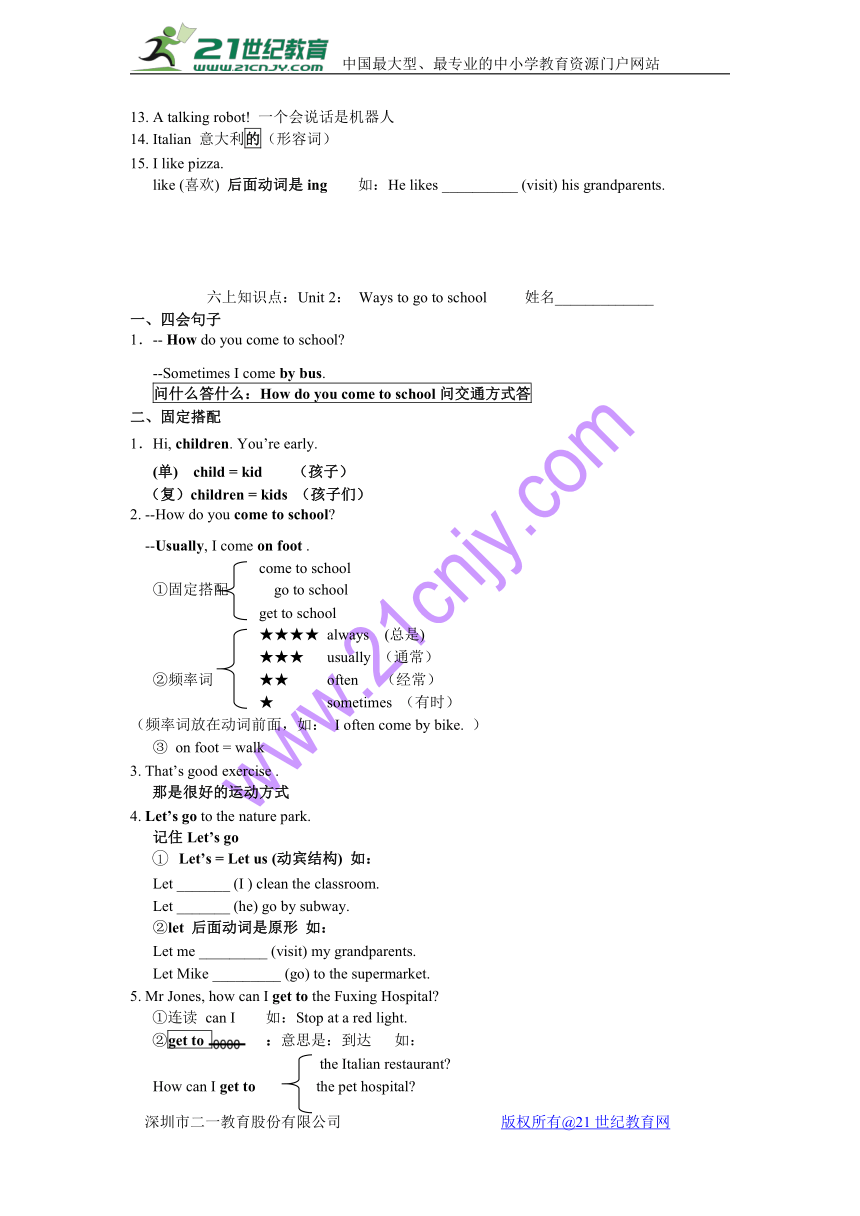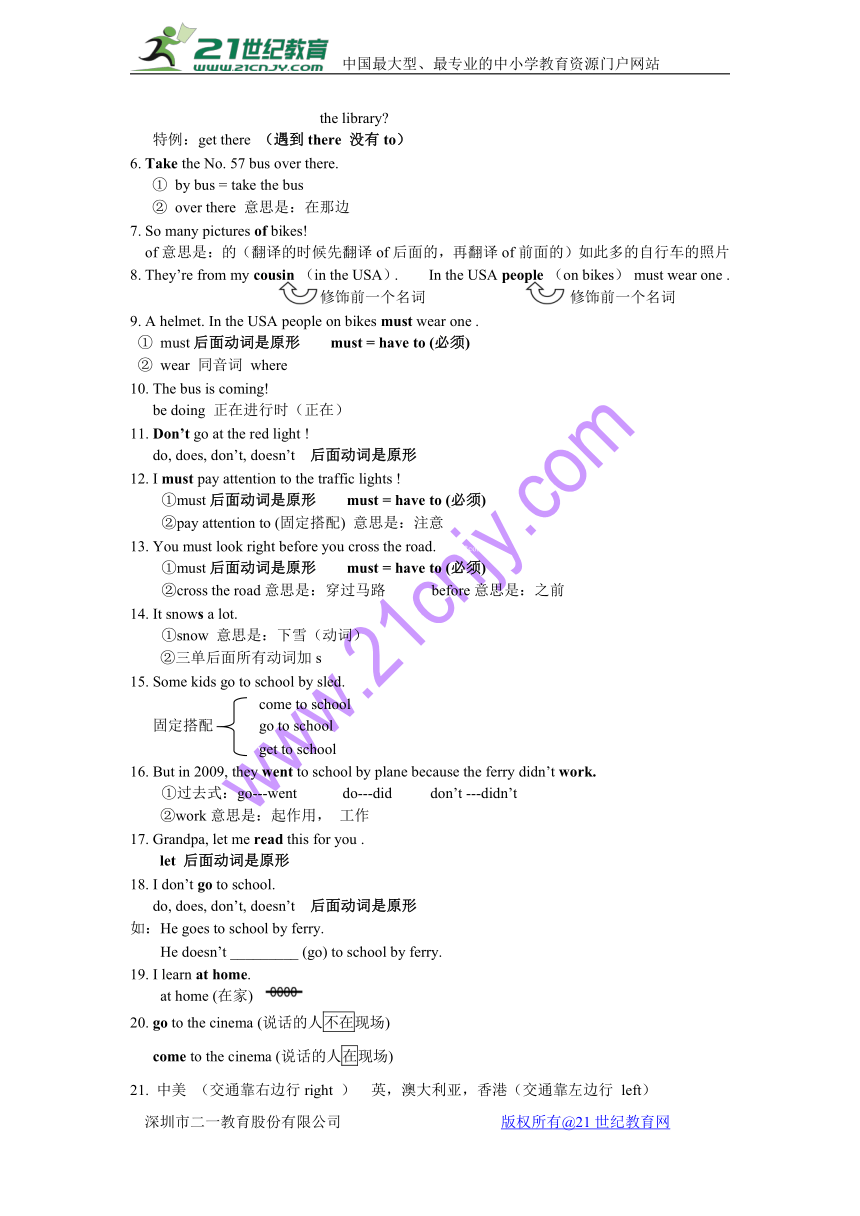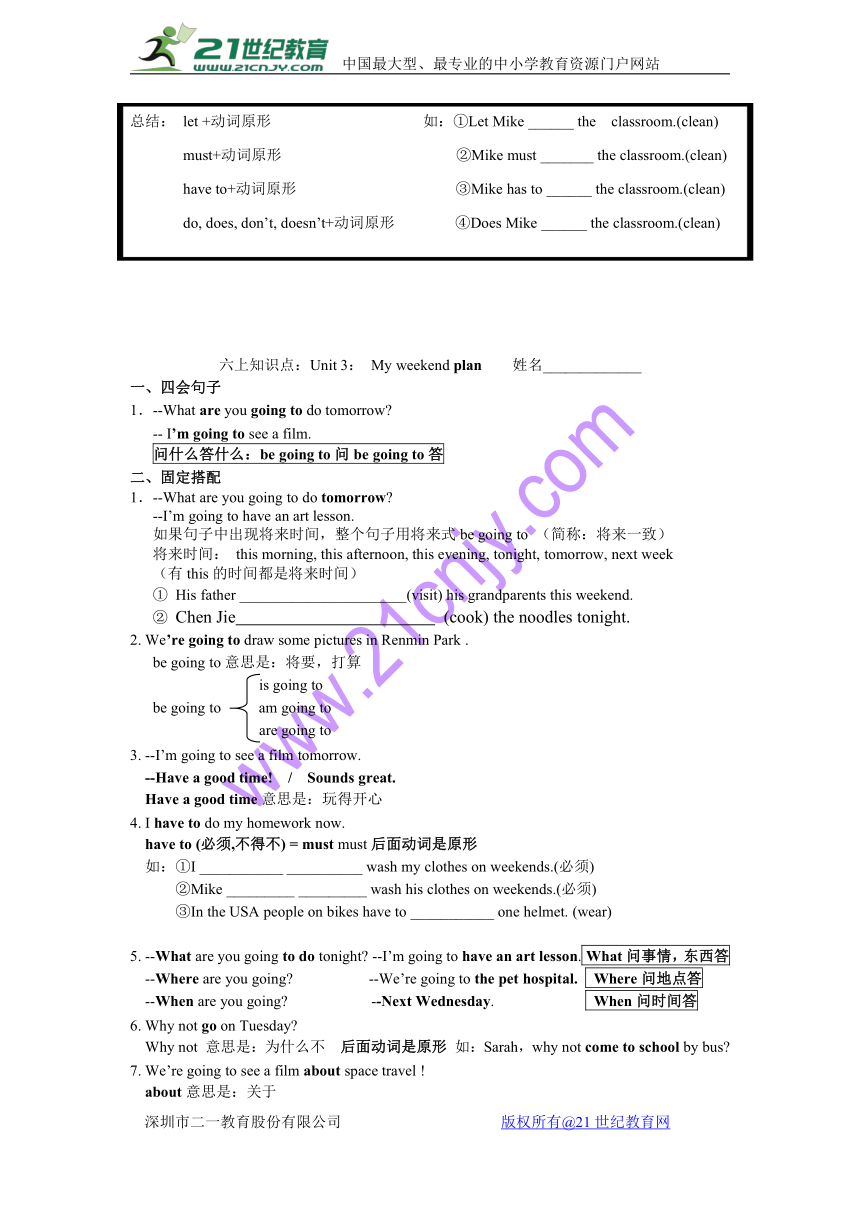人教版(PEP)小学英语六年级上册各单元知识汇总
文档属性
| 名称 | 人教版(PEP)小学英语六年级上册各单元知识汇总 |  | |
| 格式 | zip | ||
| 文件大小 | 137.0KB | ||
| 资源类型 | 教案 | ||
| 版本资源 | 人教版(PEP) | ||
| 科目 | 英语 | ||
| 更新时间 | 2017-02-08 15:16:08 | ||
图片预览




文档简介
六上知识点:Unit 1: How can I get there? 姓名_____________
一、四会句子
1.--Where is the cinema, please? 请问电影院在哪儿?
near the bookstore. 在书店的附近.
next to the bookstore. 紧挨着书店
--It’s in front of the school. 在学校的前面.
behind the park. 在公园的后面
on Dongfang Street. 在东方大街上
over there. 在那边
问什么答什么:where问地点答
2. --Is there a cinema near here ? 请问这附近有电影院吗?
--Yes, there is. / No, there isn’t. 有./没有。
问什么答什么:is there问there is答
3. --How can I get there? 我怎样到那?
-- Turn left at the cinema, then go straight. It’s on the left.
或者回答--You can take the No.31 bus. 你可乘坐31路公交车去。
问什么答什么:How can I get there问路线答
二、固定搭配
1.Excuse me, is there a cinema near here ?
Excuse me :意思是:打扰一下。用于有礼貌的对话开头。
2. How can I get to the hospital?
get to :意思是:到达 如:
the Italian restaurant?
How can I get to the pet hospital?
the library?
3. How can I get there?
get there : 意思是:到那里。get to there (遇到there 没有to)
4. How can he get there from the post office?
from意思是:从 他怎样从邮局到达那里?
5. Excuse me, is it far from here?
far from : 意思是:离…远的。
6. –Can you help me? -- Sure!
Can 问can答,有时也可灵活回答,如sure,of course 等等
7. My new GPS works!
work意思是:起作用 my new GPS是三单,三单后面所以动词+s,所以works
8. It’s on your left. on your left = on the left意思是:在你的左边
9. I want to buy a postcard.
want to : 意思是:想要 (to后面+动词原形) postcard(对的)post card(错的)
10. The Italian restaurant is on Dongfang Street.
在街上用on, 专有名词要大写,如Dongfang Street
11. Turn left at the bookstore. 在什么地方转弯用at, at意思是:在
12. What a great museum! What an interesting film!21教育名师原创作品
感叹句结构: What + a/an/无 + 形容词 + 名词 !
How +形容词 + 其他 !
13. A talking robot! 一个会说话是机器人
14. Italian 意大利的(形容词)
15. I like pizza.
like (喜欢) 后面动词是ing 如:He likes __________ (visit) his grandparents.
六上知识点:Unit 2: Ways to go to school 姓名_____________
一、四会句子
1.-- How do you come to school?
--Sometimes I come by bus.
问什么答什么:How do you come to school问交通方式答
二、固定搭配
1.Hi, children. You’re early.
(单) child = kid (孩子)
(复)children = kids (孩子们)
2. --How do you come to school?
--Usually, I come on foot .
come to school
①固定搭配 go to school
get to school
★★★★ always (总是)
★★★ usually (通常)
②频率词 ★★ often (经常)
★ sometimes (有时)
(频率词放在动词前面,如: I often come by bike. )
③ on foot = walk
3. That’s good exercise .
那是很好的运动方式
4. Let’s go to the nature park.
记住Let’s go
Let’s = Let us (动宾结构) 如:
Let _______ (I ) clean the classroom.
Let _______ (he) go by subway.
②let 后面动词是原形 如:
Let me _________ (visit) my grandparents.
Let Mike _________ (go) to the supermarket.
5. Mr Jones, how can I get to the Fuxing Hospital?21世纪教育网版权所有
①连读 can I 如:Stop at a red light.
②get to :意思是:到达 如:
the Italian restaurant?
How can I get to the pet hospital?
the library?
特例:get there (遇到there 没有to)
6. Take the No. 57 bus over there.
① by bus = take the bus
② over there 意思是:在那边
7. So many pictures of bikes!
of意思是:的(翻译的时候先翻译of后面的,再翻译of前面的)如此多的自行车的照片
8. They’re from my cousin (in the USA). In the USA people (on bikes) must wear one .
修饰前一个名词 修饰前一个名词
9. A helmet. In the USA people on bikes must wear one .2·1·c·n·j·y
① must后面动词是原形 must = have to (必须)
② wear 同音词 where
10. The bus is coming!
be doing 正在进行时(正在)
11. Don’t go at the red light !
do, does, don’t, doesn’t 后面动词是原形
12. I must pay attention to the traffic lights !
①must后面动词是原形 must = have to (必须)
②pay attention to (固定搭配) 意思是:注意
13. You must look right before you cross the road.21*cnjy*com
①must后面动词是原形 must = have to (必须)
②cross the road意思是:穿过马路 before意思是:之前
14. It snows a lot.
①snow 意思是:下雪(动词)
②三单后面所有动词加s
15. Some kids go to school by sled.
come to school
固定搭配 go to school
get to school
16. But in 2009, they went to school by plane because the ferry didn’t work.
①过去式:go---went do---did don’t ---didn’t
②work意思是:起作用, 工作
17. Grandpa, let me read this for you .
let 后面动词是原形
18. I don’t go to school.
do, does, don’t, doesn’t 后面动词是原形
如:He goes to school by ferry.
He doesn’t _________ (go) to school by ferry. 【来源:21cnj*y.co*m】
19. I learn at home.
at home (在家)
20. go to the cinema (说话的人不在现场)
come to the cinema (说话的人在现场)
21. 中美 (交通靠右边行right ) 英,澳大利亚,香港(交通靠左边行 left)
总结: let +动词原形 如:①Let Mike ______ the classroom.(clean)
must+动词原形 ②Mike must _______ the classroom.(clean)
have to+动词原形 ③Mike has to ______ the classroom.(clean)
do, does, don’t, doesn’t+动词原形 ④Does Mike ______ the classroom.(clean)
六上知识点:Unit 3: My weekend plan 姓名_____________
一、四会句子
1.--What are you going to do tomorrow?
-- I’m going to see a film.
问什么答什么:be going to问be going to答
二、固定搭配
1.--What are you going to do tomorrow?
--I’m going to have an art lesson.
如果句子中出现将来时间,整个句子用将来式be going to (简称:将来一致)
将来时间: this morning, this afternoon, this evening, tonight, tomorrow, next week
(有this的时间都是将来时间)
① His father ______________________(visit) his grandparents this weekend.
② Chen Jie (cook) the noodles tonight.
2. We’re going to draw some pictures in Renmin Park .www-2-1-cnjy-com
be going to意思是:将要,打算
is going to
be going to am going to
are going to
3. --I’m going to see a film tomorrow.
--Have a good time! / Sounds great.
Have a good time意思是:玩得开心
4. I have to do my homework now.
have to (必须,不得不) = must must后面动词是原形
如:①I ___________ __________ wash my clothes on weekends.(必须)
②Mike _________ _________ wash his clothes on weekends.(必须)
③In the USA people on bikes have to ___________ one helmet. (wear)
5. --What are you going to do tonight? --I’m going to have an art lesson. What问事情,东西答
--Where are you going? --We’re going to the pet hospital. Where问地点答
--When are you going? --Next Wednesday. When问时间答
6. Why not go on Tuesday?
Why not 意思是:为什么不 后面动词是原形 如:Sarah,why not come to school by bus?
7. We’re going to see a film about space travel !
about意思是:关于
8. I have lots of comic books about space.
lots of = a lot of (要么+s , 要么+ a)意思是:许多
9. It’s half price then!
half price意思是:半价
10. My cousin Jack is going to visit me next week.【来源:21·世纪·教育·网】
visit me 意思是:拜访我 (动宾结构)
主格
I
you
he
she
宾格
me
you
him
her
11. –What are you going to do in the nature park?
--I’m going to look for some beautiful leaves.
look for 意思是:寻找
六上知识点:Unit 4: I have a pen pal 姓名_____________
一、四会句子
1.--What is your hobby? -- I like singing.
--What is her hobby? -- She likes singing.
. --What are your hobbies? -- I like singing. I also like writing and dancing.
--What are his hobbies? -- He likes singing. He also likes writing and dancing.
二、固定搭配
1. I like reading stories.
① like + doing
② read stories (固定搭配)
2. He likes reading stories.
① 三单 + 动词s
② like + doing
③ read stories (固定搭配)
3. He lives on a farm .
① 三单 + 动词s
② on a farm (在农场上)
4. He likes doing kung fu and swimming.
①
②
③
④
5. Oh, you like singing, too.
too (也)用于句尾,有逗号(,)隔开
also (也)用于句中
either (也)用于句尾,只用于 否定句
6. I’m going to teach him the Chinese song “Jasmine Flower”!21cnjy.com
①
②
③
④
7. My best friend is Xu Wei.
best (最好的)
8. --Hey, Yifan. What are you doing?
--I’m writing an email to my new pen pal in Australia.21·cn·jy·com
① be doing 问be doing 答, be doing (正在做某事)
② write----(去e再变)writing (写字)
9.
Does he live in Sydney?
①三单 + 动词s
② do,does,don’t,doesn’t + 动词原形
10. --Does he live in Sydney?
-- No, he doesn’t.
does 问does答(问什么答什么)
11. He lives in Canberra.
Canberra 堪培拉(澳大利亚首都)
12.
Does he like doing word puzzles and going hiking?
①
②
③
④
⑤
⑥
13. Can I also be his pen pal ?
① can + 动词原形(be)
② is, am, are 的动词原形是be
14. Why not ?
Why not (固定搭配,) 意思是:为什么不呢?
三、读句子,填空
1. Zero likes ______ Chinese food very much . (eat)www.21-cn-jy.com
2. My mother ______ to bed at 8:30 every night. (go)2-1-c-n-j-y
3.My friend Mary likes ______ English. (read)
4. I am ______ an email to my brother in that city. (write)21*cnjy*com
5. Mike likes _______ pictures. (draw)
6. What _______ your hobbies? (be)
7. Does Miss Smith _______ from Australia? (come)
8. We are going to ______ mountains next weekend. (climb)21教育网
六上知识点:Unit 5: What does he do? 姓名_____________
一、四会句子
1.--What does he do? -- He is a businessman.【版权所有:21教育】
--What does she do? -- She is a police officer.
. --Where does he work? -- He works on a boat.
-- Where does she work? -- She works on a rescue plane.
二、固定搭配
1. He often goes to other countries.
other countries 其他国家 ____________ --- countries (口诀: )
2. Yeah. She‘ll be here today!
She’ll = she will 她将要
Will + 动词原形
be(成为) be (is, am, are)
be here 在这里
3. Do you want to be a head teacher, too?
4. ---Where does he work?
---He works at sea. He sees lots of fish every day!21·世纪*教育网
5. I see. How does he go to work? By boat?
6. No. He works on a boat. He goes to work by bike.【出处:21教育名师】
7. He has a very healthy life.
8. Yes. He works very hard and stays healthy.
9. We should study hard and stay healthy, too.
10. If you like science, you can be a scientist.
六上知识点:Unit 6: How do you feel? 姓名_____________
一、四会句子
1.--What does he do? -- He is a businessman.
--What does she do? -- She is a police officer.
. --Where does he work? -- He works on a boat.
-- Where does she work? -- She works on a rescue plane.
二、固定搭配
1. What’s this cartoon about?
2. He chases the mice. They’re afraid of him.
3. Because the mice are bad. They hurt people. The cat is angry with them.
4. Maybe our cat is chasing a mouse now!
5. What’s wrong?
6. Your father is ill. He should see a doctor this morning,, so we can’t go to the zoo today.
7. Don’t be sad. We can go next time.
8. How does Dad feel now?
9. Not well. Let’s go to the hospital.
10. Don’t be angry. You should take a deep breath.
一、四会句子
1.--Where is the cinema, please? 请问电影院在哪儿?
near the bookstore. 在书店的附近.
next to the bookstore. 紧挨着书店
--It’s in front of the school. 在学校的前面.
behind the park. 在公园的后面
on Dongfang Street. 在东方大街上
over there. 在那边
问什么答什么:where问地点答
2. --Is there a cinema near here ? 请问这附近有电影院吗?
--Yes, there is. / No, there isn’t. 有./没有。
问什么答什么:is there问there is答
3. --How can I get there? 我怎样到那?
-- Turn left at the cinema, then go straight. It’s on the left.
或者回答--You can take the No.31 bus. 你可乘坐31路公交车去。
问什么答什么:How can I get there问路线答
二、固定搭配
1.Excuse me, is there a cinema near here ?
Excuse me :意思是:打扰一下。用于有礼貌的对话开头。
2. How can I get to the hospital?
get to :意思是:到达 如:
the Italian restaurant?
How can I get to the pet hospital?
the library?
3. How can I get there?
get there : 意思是:到那里。get to there (遇到there 没有to)
4. How can he get there from the post office?
from意思是:从 他怎样从邮局到达那里?
5. Excuse me, is it far from here?
far from : 意思是:离…远的。
6. –Can you help me? -- Sure!
Can 问can答,有时也可灵活回答,如sure,of course 等等
7. My new GPS works!
work意思是:起作用 my new GPS是三单,三单后面所以动词+s,所以works
8. It’s on your left. on your left = on the left意思是:在你的左边
9. I want to buy a postcard.
want to : 意思是:想要 (to后面+动词原形) postcard(对的)post card(错的)
10. The Italian restaurant is on Dongfang Street.
在街上用on, 专有名词要大写,如Dongfang Street
11. Turn left at the bookstore. 在什么地方转弯用at, at意思是:在
12. What a great museum! What an interesting film!21教育名师原创作品
感叹句结构: What + a/an/无 + 形容词 + 名词 !
How +形容词 + 其他 !
13. A talking robot! 一个会说话是机器人
14. Italian 意大利的(形容词)
15. I like pizza.
like (喜欢) 后面动词是ing 如:He likes __________ (visit) his grandparents.
六上知识点:Unit 2: Ways to go to school 姓名_____________
一、四会句子
1.-- How do you come to school?
--Sometimes I come by bus.
问什么答什么:How do you come to school问交通方式答
二、固定搭配
1.Hi, children. You’re early.
(单) child = kid (孩子)
(复)children = kids (孩子们)
2. --How do you come to school?
--Usually, I come on foot .
come to school
①固定搭配 go to school
get to school
★★★★ always (总是)
★★★ usually (通常)
②频率词 ★★ often (经常)
★ sometimes (有时)
(频率词放在动词前面,如: I often come by bike. )
③ on foot = walk
3. That’s good exercise .
那是很好的运动方式
4. Let’s go to the nature park.
记住Let’s go
Let’s = Let us (动宾结构) 如:
Let _______ (I ) clean the classroom.
Let _______ (he) go by subway.
②let 后面动词是原形 如:
Let me _________ (visit) my grandparents.
Let Mike _________ (go) to the supermarket.
5. Mr Jones, how can I get to the Fuxing Hospital?21世纪教育网版权所有
①连读 can I 如:Stop at a red light.
②get to :意思是:到达 如:
the Italian restaurant?
How can I get to the pet hospital?
the library?
特例:get there (遇到there 没有to)
6. Take the No. 57 bus over there.
① by bus = take the bus
② over there 意思是:在那边
7. So many pictures of bikes!
of意思是:的(翻译的时候先翻译of后面的,再翻译of前面的)如此多的自行车的照片
8. They’re from my cousin (in the USA). In the USA people (on bikes) must wear one .
修饰前一个名词 修饰前一个名词
9. A helmet. In the USA people on bikes must wear one .2·1·c·n·j·y
① must后面动词是原形 must = have to (必须)
② wear 同音词 where
10. The bus is coming!
be doing 正在进行时(正在)
11. Don’t go at the red light !
do, does, don’t, doesn’t 后面动词是原形
12. I must pay attention to the traffic lights !
①must后面动词是原形 must = have to (必须)
②pay attention to (固定搭配) 意思是:注意
13. You must look right before you cross the road.21*cnjy*com
①must后面动词是原形 must = have to (必须)
②cross the road意思是:穿过马路 before意思是:之前
14. It snows a lot.
①snow 意思是:下雪(动词)
②三单后面所有动词加s
15. Some kids go to school by sled.
come to school
固定搭配 go to school
get to school
16. But in 2009, they went to school by plane because the ferry didn’t work.
①过去式:go---went do---did don’t ---didn’t
②work意思是:起作用, 工作
17. Grandpa, let me read this for you .
let 后面动词是原形
18. I don’t go to school.
do, does, don’t, doesn’t 后面动词是原形
如:He goes to school by ferry.
He doesn’t _________ (go) to school by ferry. 【来源:21cnj*y.co*m】
19. I learn at home.
at home (在家)
20. go to the cinema (说话的人不在现场)
come to the cinema (说话的人在现场)
21. 中美 (交通靠右边行right ) 英,澳大利亚,香港(交通靠左边行 left)
总结: let +动词原形 如:①Let Mike ______ the classroom.(clean)
must+动词原形 ②Mike must _______ the classroom.(clean)
have to+动词原形 ③Mike has to ______ the classroom.(clean)
do, does, don’t, doesn’t+动词原形 ④Does Mike ______ the classroom.(clean)
六上知识点:Unit 3: My weekend plan 姓名_____________
一、四会句子
1.--What are you going to do tomorrow?
-- I’m going to see a film.
问什么答什么:be going to问be going to答
二、固定搭配
1.--What are you going to do tomorrow?
--I’m going to have an art lesson.
如果句子中出现将来时间,整个句子用将来式be going to (简称:将来一致)
将来时间: this morning, this afternoon, this evening, tonight, tomorrow, next week
(有this的时间都是将来时间)
① His father ______________________(visit) his grandparents this weekend.
② Chen Jie (cook) the noodles tonight.
2. We’re going to draw some pictures in Renmin Park .www-2-1-cnjy-com
be going to意思是:将要,打算
is going to
be going to am going to
are going to
3. --I’m going to see a film tomorrow.
--Have a good time! / Sounds great.
Have a good time意思是:玩得开心
4. I have to do my homework now.
have to (必须,不得不) = must must后面动词是原形
如:①I ___________ __________ wash my clothes on weekends.(必须)
②Mike _________ _________ wash his clothes on weekends.(必须)
③In the USA people on bikes have to ___________ one helmet. (wear)
5. --What are you going to do tonight? --I’m going to have an art lesson. What问事情,东西答
--Where are you going? --We’re going to the pet hospital. Where问地点答
--When are you going? --Next Wednesday. When问时间答
6. Why not go on Tuesday?
Why not 意思是:为什么不 后面动词是原形 如:Sarah,why not come to school by bus?
7. We’re going to see a film about space travel !
about意思是:关于
8. I have lots of comic books about space.
lots of = a lot of (要么+s , 要么+ a)意思是:许多
9. It’s half price then!
half price意思是:半价
10. My cousin Jack is going to visit me next week.【来源:21·世纪·教育·网】
visit me 意思是:拜访我 (动宾结构)
主格
I
you
he
she
宾格
me
you
him
her
11. –What are you going to do in the nature park?
--I’m going to look for some beautiful leaves.
look for 意思是:寻找
六上知识点:Unit 4: I have a pen pal 姓名_____________
一、四会句子
1.--What is your hobby? -- I like singing.
--What is her hobby? -- She likes singing.
. --What are your hobbies? -- I like singing. I also like writing and dancing.
--What are his hobbies? -- He likes singing. He also likes writing and dancing.
二、固定搭配
1. I like reading stories.
① like + doing
② read stories (固定搭配)
2. He likes reading stories.
① 三单 + 动词s
② like + doing
③ read stories (固定搭配)
3. He lives on a farm .
① 三单 + 动词s
② on a farm (在农场上)
4. He likes doing kung fu and swimming.
①
②
③
④
5. Oh, you like singing, too.
too (也)用于句尾,有逗号(,)隔开
also (也)用于句中
either (也)用于句尾,只用于 否定句
6. I’m going to teach him the Chinese song “Jasmine Flower”!21cnjy.com
①
②
③
④
7. My best friend is Xu Wei.
best (最好的)
8. --Hey, Yifan. What are you doing?
--I’m writing an email to my new pen pal in Australia.21·cn·jy·com
① be doing 问be doing 答, be doing (正在做某事)
② write----(去e再变)writing (写字)
9.
Does he live in Sydney?
①三单 + 动词s
② do,does,don’t,doesn’t + 动词原形
10. --Does he live in Sydney?
-- No, he doesn’t.
does 问does答(问什么答什么)
11. He lives in Canberra.
Canberra 堪培拉(澳大利亚首都)
12.
Does he like doing word puzzles and going hiking?
①
②
③
④
⑤
⑥
13. Can I also be his pen pal ?
① can + 动词原形(be)
② is, am, are 的动词原形是be
14. Why not ?
Why not (固定搭配,) 意思是:为什么不呢?
三、读句子,填空
1. Zero likes ______ Chinese food very much . (eat)www.21-cn-jy.com
2. My mother ______ to bed at 8:30 every night. (go)2-1-c-n-j-y
3.My friend Mary likes ______ English. (read)
4. I am ______ an email to my brother in that city. (write)21*cnjy*com
5. Mike likes _______ pictures. (draw)
6. What _______ your hobbies? (be)
7. Does Miss Smith _______ from Australia? (come)
8. We are going to ______ mountains next weekend. (climb)21教育网
六上知识点:Unit 5: What does he do? 姓名_____________
一、四会句子
1.--What does he do? -- He is a businessman.【版权所有:21教育】
--What does she do? -- She is a police officer.
. --Where does he work? -- He works on a boat.
-- Where does she work? -- She works on a rescue plane.
二、固定搭配
1. He often goes to other countries.
other countries 其他国家 ____________ --- countries (口诀: )
2. Yeah. She‘ll be here today!
She’ll = she will 她将要
Will + 动词原形
be(成为) be (is, am, are)
be here 在这里
3. Do you want to be a head teacher, too?
4. ---Where does he work?
---He works at sea. He sees lots of fish every day!21·世纪*教育网
5. I see. How does he go to work? By boat?
6. No. He works on a boat. He goes to work by bike.【出处:21教育名师】
7. He has a very healthy life.
8. Yes. He works very hard and stays healthy.
9. We should study hard and stay healthy, too.
10. If you like science, you can be a scientist.
六上知识点:Unit 6: How do you feel? 姓名_____________
一、四会句子
1.--What does he do? -- He is a businessman.
--What does she do? -- She is a police officer.
. --Where does he work? -- He works on a boat.
-- Where does she work? -- She works on a rescue plane.
二、固定搭配
1. What’s this cartoon about?
2. He chases the mice. They’re afraid of him.
3. Because the mice are bad. They hurt people. The cat is angry with them.
4. Maybe our cat is chasing a mouse now!
5. What’s wrong?
6. Your father is ill. He should see a doctor this morning,, so we can’t go to the zoo today.
7. Don’t be sad. We can go next time.
8. How does Dad feel now?
9. Not well. Let’s go to the hospital.
10. Don’t be angry. You should take a deep breath.
同课章节目录
